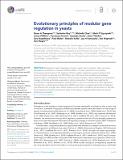Evolutionary principles of modular gene regulation in yeasts
Author(s)
Thompson, Dawn A.; Roy, Sushmita; Chan, Michelle Mei Wah; Styczynsky, Mark P.; Pfiffner, Jenna; French, Courtney; Socha, Amanda; Thielke, Anne; Napolitano, Sara; Muller, Paul; Kellis, Manolis; Konieczka, Jay; Wapinski, Ilan; Regev, Aviv; ... Show more Show less
DownloadRegev_Evolutionary principles.pdf (6.091Mb)
PUBLISHER_CC
Publisher with Creative Commons License
Creative Commons Attribution
Terms of use
Metadata
Show full item recordAbstract
Divergence in gene regulation can play a major role in evolution. Here, we used a phylogenetic framework to measure mRNA profiles in 15 yeast species from the phylum Ascomycota and reconstruct the evolution of their modular regulatory programs along a time course of growth on glucose over 300 million years. We found that modules have diverged proportionally to phylogenetic distance, with prominent changes in gene regulation accompanying changes in lifestyle and ploidy, especially in carbon metabolism. Paralogs have significantly contributed to regulatory divergence, typically within a very short window from their duplication. Paralogs from a whole genome duplication (WGD) event have a uniquely substantial contribution that extends over a longer span. Similar patterns occur when considering the evolution of the heat shock regulatory program measured in eight of the species, suggesting that these are general evolutionary principles.
Date issued
2013-06Department
Massachusetts Institute of Technology. Computational and Systems Biology Program; Massachusetts Institute of Technology. Computer Science and Artificial Intelligence Laboratory; Massachusetts Institute of Technology. Department of Biology; Massachusetts Institute of Technology. Department of Electrical Engineering and Computer ScienceJournal
eLife
Publisher
eLife Sciences Publications, Ltd
Citation
Thompson, D. A., S. Roy, M. Chan, M. P. Styczynsky, J. Pfiffner, C. French, A. Socha, et al. “Evolutionary principles of modular gene regulation in yeasts.” eLife 2, no. 0 (January 8, 2013): e00603-e00603.
Version: Final published version
ISSN
2050-084X